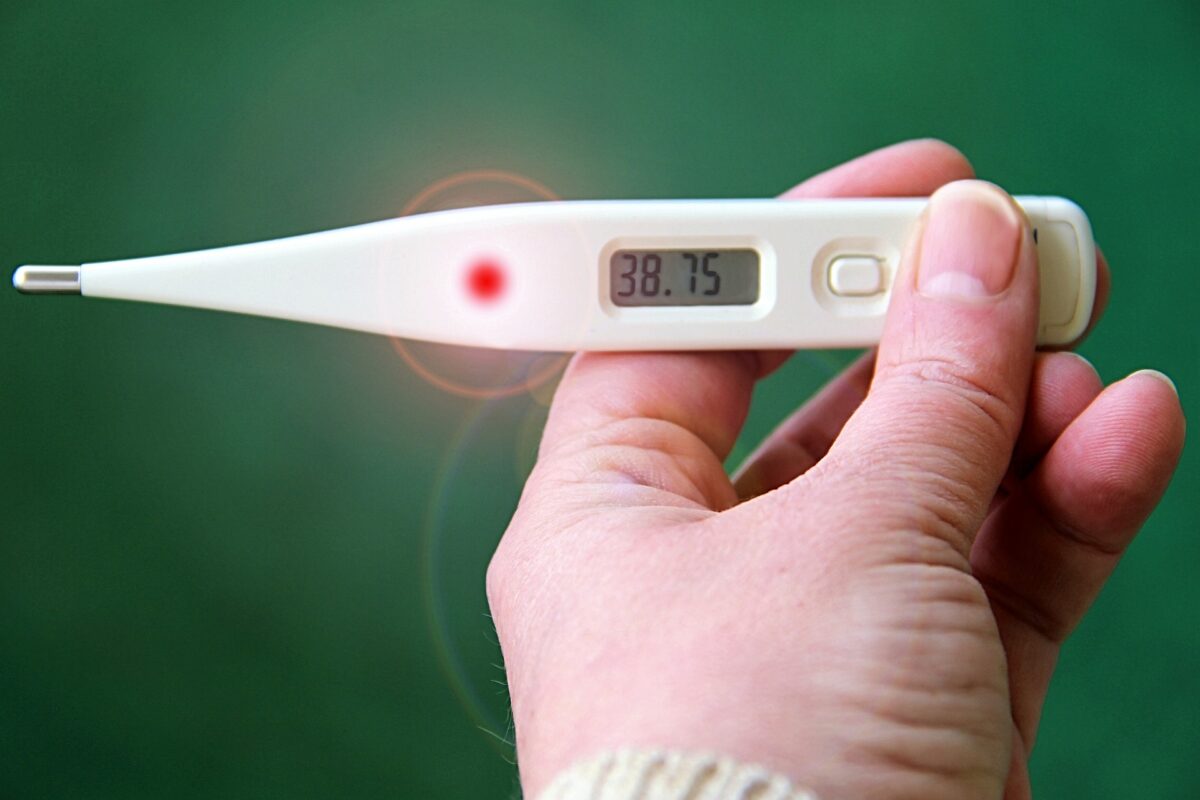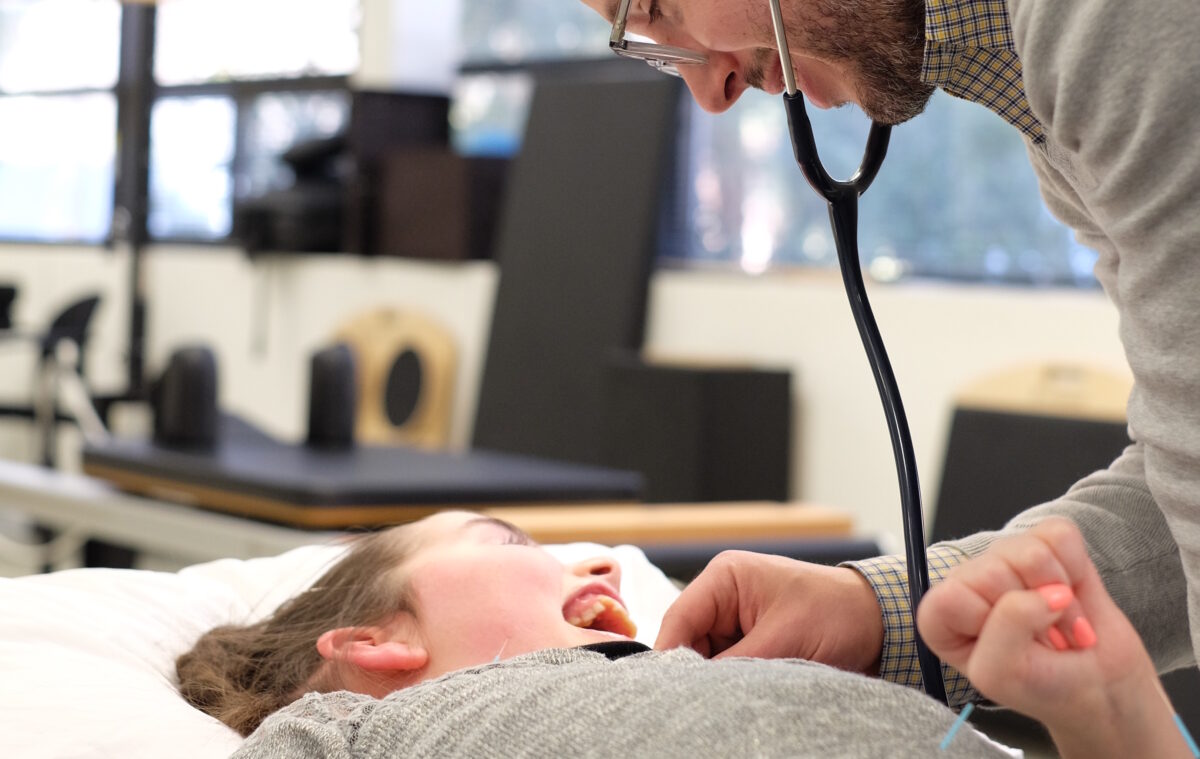It’s that time of year again—cold and flu season is in full swing. This year we have 3 major culprits to worry about: RSV (Respiratory Syncytial Virus), COVID-19 and Influenza. As a parent, it can be difficult to know when your child’s cold or flu is serious enough to warrant a trip to the hospital. After all, you don’t want to overreact and take your child to the ER for a minor illness, but you also don’t want to wait too long and risk their health. So, when should you take your child to the hospital for a cold or flu? Read on to find out.
Fever
One of the most common symptoms of both colds and flu is fever. A fever itself is not necessarily cause for alarm, but it can be a useful indicator of how serious your child’s illness is. For example, fevers caused by potentially dangerous illnesses like meningitis or sepsis will usually be quite high—usually 103 degrees Fahrenheit (39.4 celsius) or higher. In contrast, fevers caused by minor illnesses like the common cold will usually be lower—between 101 and 102 degrees Fahrenheit (38.3-38.9 celsius). Of course, every child is different, so if you’re ever unsure whether your child’s fever is cause for concern, it’s always best to err on the side of caution and give your healthcare provider a call.
Fever can be beneficial
Fever may actually be beneficial to a child as it is a natural response of the immune system that helps to fight infection. Fever increases the body’s temperature, which in turn helps to kill bacteria and viruses. It also causes the body to release more white blood cells, which helps to fight infection. In some cases, fever may even help to shorten the duration of an illness. For these reasons, it is important not to treat fever too aggressively and instead allow the body to work naturally to combat infection.
Coughing and Sneezing
Another common symptom of colds and flu is coughing and sneezing. These symptoms are usually nothing to worry about—they’re just your body’s natural response to trying to get rid of the virus. However, if your child is having difficulty breathing or their cough sounds particularly harsh or wet, this could be a sign of something more serious, like pneumonia. If you’re concerned about your child’s coughing or sneezing, it’s always best to consult with their doctor.
For minor cough and sore throat, there are many effective naturopathic options. Some of my favorites include: Elderberry syrup, honey, propolis, nin jiom herbal syrup, Ivy leaf and thyme based syrups. If a cough/sore throat is particularly bad at nighttime children’s Advil and or Benadryl can help with symptom relief; however, it is a good idea to consult your doctor prior to usage.
Body Aches
Body aches are another common symptom of both colds and flu. Usually, these aches are nothing to worry about and will go away on their own in a few days. However, if your child seems especially uncomfortable or if they’re having difficulty moving around due to pain, this could be a sign that they have something more serious like rheumatic fever. As always, if you’re concerned about your child’s health, it’s best to consult with their healthcare provider.
Conclusion
Cold and flu season can be tough for parents who want to do everything they can to keep their children healthy but don’t want to overreact every time they get a little sniffle. Hopefully this article has given you some guidance on when to take your child to the hospital for a cold or flu. Remember: if you’re ever unsure, it’s always better to err on the side of caution and give your pediatrician a call. They would be more than happy to help you figure out whether or not your child needs medical attention.
According to the CDC, 6.1 million American children have been diagnosed with Attention Deficit Hyperactivity Disorder. Here in Canada the prevalence of ADHD in children is about 5%-9%. If your child has been diagnosed with ADHD, you’re probably wondering what you can do to help them. While there is no cure for ADHD, there are treatments that can help your child focus and succeed. Here are 10 natural treatments for ADHD that really work.
1. Omega-3s
Omega-3 fatty acids are essential for brain development and function. There is a lot of clinical research that supports the use of omega-3 supplements for children with ADHD. One study published in the journal Pediatrics showed that children who took omega-3 supplements had improved symptoms compared to those who didn’t take supplements. Another study, published in the Journal of Attention Disorders, showed that children who took omega-3 supplements had better focus and attention span. These studies suggest that omega-3 supplementation is a safe and effective treatment for ADHD symptoms. You can give your child an omega-3 supplement or increase their intake of fatty fish like salmon, mackerel, and herring.
2. Probiotics
Probiotics are live bacteria that are found in yogurt, sauerkraut, and other fermented foods. They help promote a healthy gut by keeping the balance of good and bad bacteria in check. A study published in the journal Nutrients found that probiotics were able to reduce symptoms of ADHD in children. The study found that the probiotic Lactobacillus rhamnosus was able to improve attention, hyperactivity, and impulsiveness in the children who took it. Another study published in the journal Pediatrics found that a combination of probiotics and prebiotics was able to improve symptoms of ADHD in children. A healthy gut has been linked to better mental health, so probiotics are a great natural treatment for ADHD.
3. Exercise
Exercise is a great way to release energy and improve focus. It also helps improve sleep, which is often an issue for children with ADHD. A study by the University of Massachusetts found that children who exercised for 30 minutes each day had improved focus and less hyperactivity.
4. Caffeine
Caffeine is a stimulant that can help improve focus and concentration. However, it should be used in moderation as too much caffeine can cause side effects like anxiety and irritability. A cup of tea in the morning can potentially help your child focus at school or during homework time. Clinical research has shown that caffeine can help improve cognitive function and memory recall. Additionally, caffeine can help increase energy levels and decrease fatigue. For these reasons, caffeine can be an effective tool for improving focus and productivity. However, it is important to note that caffeine should not be used by children under the age of 12.
5. Limit Screen Time
Screen time includes TV, video games, computers, and phones. Clinical research indicates that screen time can worsen symptoms of ADHD by causing restlessness and impulsivity. In one study, children with ADHD who were limited to 2 hours of screen time per day had improved attention and behavior. Another study found that children who exceeded 2 hours of screen time per day were more likely to have problems with inattention, hyperactivity, and aggressiveness. Therefore, it is important to limit screen time to no more than 2 hours per day for children with ADHD.
6. Get Enough Sleep
Sleep is essential for focus, concentration, and overall mental health. Children with ADHD often have difficulty falling asleep and staying asleep through the night. Establishing a bedtime routine can help your child wind down before sleep and feel more rested during the day. aim for at least 9 hours of sleep per night for children with ADHD.
7. Eat a Healthy Diet
A healthy diet is important for everyone, but it is especially important for children with ADHD. A diet high in sugar and processed foods can worsen symptoms while a diet rich in fruits, vegetables, and protein can improve them. Studies have shown that a healthy diet can help to improve ADHD symptoms. One study found that children who followed a healthy diet had improved focus and attention, less hyperactivity and impulsiveness, and better behavior overall.
8. Drink Plenty of Water
Studies have shown that dehydration can contribute to a decline in cognitive function and overall productivity. In one study, subjects who were mildly dehydrated scored lower on tests of mental performance and vigilance than those who were hydrated. Another study showed that dehydration can cause headaches and fatigue, both of which can lead to decreased concentration. It is therefore important for children to drink plenty of water throughout the day to stay focused and alert.
9. Try Herbal Supplements
Clinical research has shown that some herbal supplements can improve symptoms of ADHD. For example, a study published in the journal Biological Psychiatry found that ginkgo biloba improved attention and processing speed in adults with ADHD. Another study published in the journal Phytotherapy Research found that green tea improved symptoms of ADHD in children. And a study published in the journal Chemistry & Industry found that lemon balm improved focus and attention in children with ADHD.
10. Consider Neurofeedback Therapy
Neurofeedback therapy is a type of biofeedback that uses brain waves to feedback information about attention levels. This information is then used to train the brain to focus better. Neurofeedback therapy has been extensively researched and has been shown to be an effective treatment for ADHD. One study found that children who received neurofeedback therapy showed significantly better attention and behavior than those who did not receive the therapy. In addition, the benefits of neurofeedback therapy were found to last for up to two years after the therapy ended. This makes neurofeedback a desirable treatment for ADHD, as the long-term results are much better than those of medications.
Conclusion:
If your child has been diagnosed with attention deficit hyperactivity disorder (ADHD), you’re probably wondering what you can do to help them cope with the condition. Thankfully, there are many natural treatments that can help improve symptoms without the use of medication. By implementing some (or all) of these treatments into your child’s life, you can help them focus better, sleep better, eat better and feel better .
As a mom or dad, you want what’s best for your children. You want them to be happy and healthy, and you want to do everything you can to help them reach their full potential. When it comes to their health, naturopathic care is one of the best things you can do for your kids. Here are 10 reasons why:
1. Holistic Care
Naturopathic care focuses on the whole child, not just the symptoms of whatever condition they happen to be experiencing at the moment. This means that treatment is tailored to the individual child, taking into account all aspects of their health, both physical and emotional.
2. Prevention
Naturopathic care is all about preventing illness before it has a chance to take hold. By teaching kids healthy habits and helping them to develop a strong foundation of wellness, naturopathic doctors can help keep your kid(s) healthy throughout their lives.
3. Natural Medicines
Naturopathic care relies heavily on natural therapies and treatments rather than harsh chemicals or drugs. This is important because it means that there are generally fewer side effects and risks involved with naturopathic care than there are with conventional medical treatments.
4. Safety
Because naturopathic care is so gentle and natural, it’s safe for even very young children. In fact, many parents choose naturopathic care for their babies and toddlers precisely because it is so safe and gentle.
5. Efficacy
Don’t let the gentle nature of naturopathic care fool you—it is highly effective in treating a wide variety of conditions in children of all ages. From colds and flus to chronic conditions like allergies and asthma, naturopathic care can help your child feel better and improve their overall health.
6. Affordability
Because naturopathic care is covered by most insurance plans, it is often more affordable than other forms of medical treatment. This makes it a great option for families on a budget who still want to give their children the best possible care.
7. Convenience
It’s convenient. Naturopathic doctors often offer convenient office hours and locations, making it easy for busy families to get the care they need without having to miss work or school unnecessarily. Additionally, many naturopathic clinics, include ours, offer online scheduling and telemedicine options. This makes access to care even easier!
8. Evidence based
Naturopathic care is based on solid scientific evidence—not just anecdotal evidence or old wives’ tales! This means that you can be confident that the treatments your child receives are backed by research and are proven to be effective in treating a variety of conditions.
9. Education
One of the best things about naturopathic care is that it helps kids learn healthy habits that will last a lifetime. By teaching them how to eat right, exercise regularly, manage stress effectively, and more, naturopathic doctors set kids up for success both now and in the future.
10. Primary Care
In some cases, early intervention with naturopathic care can literally save a child’s life. For example, if your child has a genetic predisposition for heart disease or cancer, starting them on a program of naturopathic prevention could help them avoid ever developing the disease in the first place. Additionally, naturopathic doctors are primary care physicians who can run lab tests and make diagnosis similarly to a pediatrician.
Conclusion
Naturopathic care offers countless benefits for children of all ages. If you’re looking for an alternative to conventional medicine or just want to give your child the best possible chance at good health throughout their life, consider making an appointment with a naturopathic doctor today!
Book a free 15 minute introductory consult
The Top 10 Supplements for Kids’ Health
As a parent, you want what’s best for your child. When it comes to their health, you want to make sure they’re getting all the nutrients they need to grow and thrive. But sometimes, despite our best efforts, kids don’t get all the nutrients they need from their diet alone. That’s where supplements come in.
Multivitamin:
A multivitamin is a supplement that contains a variety of vitamins and minerals. It’s a good way to ensure that your child is getting all the essential nutrients they need, even if their diet is lacking in some areas.
Kids often go through periods where they’re less than eager to eat certain foods. This is a normal stage in the development of taste buds, and starting with a good quality multivitamin will help your child get back on track during this time!
Compliance is the most important thing when it comes to giving kids supplements. If your child will not take their vitamins you might as well throw them in the garbage. It’s important to try a few different brands in order to see if your child has a specific preference. A naturopathic doctor with experience in working with kids can be very helpful in choosing a few options.
Some of my most frequently recommended include: SmartyPants Kids Formula, ND Shake for Kids by Orange Naturals, and Kids Multivitamin Liquid spray by Organika.
Probiotic:
Probiotics are live bacteria that are good for gut health. They can help with digestion and absorption of nutrients, and they can also help boost the immune system.
There are many different strains of probiotics and many of them have specific effects for specific conditions. This is another reason why it is important to consult with a Naturopathic doctor before choosing which product is right for your child. Some of my most recommended brands include: Culturelle, BioGaia, Vita Aid, and Genestra.
Fish Oil:
Fish oil is a good source of omega-3 fatty acids, which are important for brain development and heart health.
Omega-3 fatty acids are important for many aspects of health, including brain development and heart health. Research has shown that omega-3 fatty acids may help improve cognitive function in children, as well as protect against certain conditions such as depression and ADHD.
For example, a study published in the journal Scientific Reports found that children who consumed higher amounts of omega-3 fatty acids had better reading comprehension and short-term verbal memory compared to those with lower intakes. Another study published in BMC Public Health reported that children with higher levels of omega-3 fatty acids in their blood were less likely to exhibit symptoms of depression.
Additionally, studies have shown that consuming adequate amounts of omega-3 fatty acids is important for supporting healthy cardiovascular function in children.
For example, one study published in the American Journal of Clinical Nutrition found that higher intakes of fish oil was associated with improved arterial elasticity in adolescents. Overall, there is strong evidence to support the benefits of consuming omega-3 fatty acids for kids, both for brain development and overall health.
Some brands that I frequently recommend are NutraSea, Honibee, Nordic Naturals and Botanica.
Elderberry Syrup:
Elderberry syrup has long been touted as a natural remedy for fighting off colds and flu in both children and adults. This is due, in part, to the high antioxidant and vitamin content of elderberry. Studies have shown that elderberry can help boost the immune system and shorten the duration of cold or flu symptoms.
For example, one study found that elderberry extract was just as effective at reducing the duration of cold symptoms compared to acetaminophen (a common painkiller). Another study showed that taking an elderberry syrup daily during flu season could reduce the risk of developing illness by up to 58%. Overall, these findings suggest that elderberry may be a powerful tool for reducing the risk and severity of colds and flu in both kids and adults.
I often recommend Sambucol as they have independently researched their product for its efficacy.
Magnesium:
There is a growing body of research demonstrating the benefits of magnesium in certain childhood conditions. In particular, studies have shown that magnesium can help prevent and treat asthma, ease symptoms of irritable bowel syndrome, and even reduce symptoms of anxiety and depression.
Additionally, it has been shown to be effective in reducing the risk of osteoporosis later in life, which makes it an important supplement for children who are still growing. Overall, magnesium appears to be a safe and effective way to promote healthy development and overall wellness in children.
Magnesium is important for the body and it can be hard to know which type or salt would work best. Consult with your Naturopath as they will have experience in this area!
Zinc:
One study found that zinc supplements may help to prevent and treat diarrhea in children, which is a common cause of weight loss and malnutrition. Another study showed that zinc can be effective in reducing the frequency of respiratory infections in children, such as colds and flu.
Additionally, research has demonstrated that zinc can be beneficial for wound healing, particularly in patients with diabetes and other conditions that impair circulation.
Overall, these studies suggest that zinc plays an important role in protecting against certain diseases and conditions of childhood, as well as supporting growth and healthy functioning of the immune system.
It is important to speak with your naturopath about how best use zinc because it can lead other nutritional deficiencies if taken long term.
Propolis Spray:
Propolis is a substance made by bees that has antibacterial and anti-inflammatory properties. Propolis has long been known for its antibacterial and anti-inflammatory properties, which make it an excellent tool for boosting immunity and healing wounds.
A number of studies have shown that propolis can be effective in treating a variety of childhood conditions, including colds and flu, ear infections, and skin irritations.
For example, one study found that children treated with propolis showed significant improvement in symptoms of upper respiratory tract infections, such as coughing and fever, within just 3 days of treatment. The antibacterial properties of propolis also make it an effective treatment for ear infections by helping to eliminate the bacteria that cause these infections.
Finally, propolis has been shown to be effective in treating minor skin irritations like eczema or rashes by reducing inflammation and speeding up the healing process. Overall, these findings highlight the powerful benefits of propolis for children’s health and well-being.It’s great for boosting immunity and healing wounds.
I often recommend the propolis spray by Beekeepers Naturals for sore throats.
Vitamin C:
Vitamin C is an essential nutrient for children because it plays a key role in immunity, tissue repair, and collagen production.
Numerous studies have demonstrated that adequate intake of vitamin C can help protect children from a range of health problems, including common colds and respiratory infections.
Additionally, vitamin C is involved in wound healing, which makes it important for children who are frequently active or injured. Furthermore, vitamin C plays a central role in the production of collagen, which is important for supporting healthy skin and connective tissues throughout the body.
Overall, these benefits make it clear that vitamin C is an important nutrient for childhood development and overall health.
Vitamin C is one vitamin that doesn’t really need to be from a specific brand. The most important thing is to find one your child likes to take.
Vitamin D:
There is a growing body of evidence demonstrating the many benefits of vitamin D for children. Studies have shown that adequate levels of vitamin D can help to improve bone health and prevent conditions like osteoporosis later in life.
Additionally, this crucial nutrient plays an important role in immune function, allowing children’s bodies to fight off illnesses and infections more effectively. Furthermore, vitamin D is involved in numerous cellular processes, helping to regulate cell growth and development, maintain proper organ function, and support overall metabolic health.
Overall, maintaining sufficient levels of this key vitamin is essential for promoting optimal health and well-being in children.
There is a lot of differing opinions when it comes to vitamin d dosing in kids. Therefore it is important to speak with your healthcare provider about dosing for children.
Melatonin:
Studies have shown that melatonin can be helpful for children who have difficulty sleeping or have jet lag. This is because it helps to regulate the body’s sleep cycles, allowing kids to fall asleep more easily and stay asleep longer.
Additionally, there is some evidence that melatonin may help reduce the severity of conditions like ADHD and autism, though more research is needed in this area.
Overall, melatonin is considered a safe and effective option for treating sleep disturbances in children, though it should only be used as directed by a healthcare professional.
I have found that melatonin works best when started at a low dose. When choosing your product try to find one that is a maximum of 1mg per dose.
Conclusion:
As parents, we want what’s best for our children. When it comes to their health, we want to make sure they’re getting all the nutrients they need to grow and thrive. Sometimes, however, kids don’t get all the nutrients they need from their diet alone. That’s where supplements come in. A multivitamin, probiotic, fish oil, elderberry syrup, magnesium, zinc, propolis spray, vitamin C, vitamin D, or melatonin can help fill in any gaps in your child’s nutrition and keep them healthy and happy!
Cold and Flu season is here! Now that kids are back to school and the season is changing we should start thinking about preventing colds and flu. As a Naturopathic Doctor part of my job is counseling parents on safe and effective ways to treat and prevent colds and flu for the whole family. Here are 5 things that will help prevent colds and flu and can even help to ameliorate symptoms and shorten duration of an active infection.
-
Probiotics
Probiotics help boost the immune system – Studies have shown that probiotics affect immune cells throughout the body. When certain strains of probiotics are introduced into our intestine they help to repair intestinal cells and they boost production of antimicrobial substances. In one study, 326 children aged 3-5 years were randomly assigned to receive, in double-blind fashion, probiotic supplementation. Treatments were given twice per day in divided doses for 6 months, including the winter season. Compared with placebo, the probiotic group had the following results; fever reduction 53-73%, cough reduction 41-62%, decreased runny nose 28-59%, decreased need for antibiotics 68-82%, reduced absence from school 28-32%.
-
Elderberry
Elderberry extracts inhibit bacteria and viruses – Not only does elderberry syrup taste great, studies have shown that it inhibits the bacteria and viruses associated with common colds and the flu. One study demonstrated that an elderberry liquid extract possesses antimicrobial activity against both streptococci bacteria and influenza viruses. Another study looked at 312 air travellers flying from Australia to an overseas destination. Those travellers who took an elderberry extract before, during and after travel had fewer colds, less sick days and less symptoms.
-
Vitamin C
Vitamin C supports immune cells – Vitamin C is very important for optimal immune system functioning. Vitamin C helps immune cells get to where they need to be, kill pathogens effectively, protect the body from damage and clean up after battling infections. Studies have shown that adequate vitamin C in the blood helps prevent infections, is necessary to fight infections and helps with recovery. The recommended daily intake of vitamin C is 100-200mg/day; however during active infection, the metabolic demand increases and therefore the requirement for vitamin C is likely to be higher. Even in this day and age, vitamin C is the fourth leading nutrient deficiency in North America. Poor diet and increases in free radical exposure due to an unhealthy lifestyle may be contributing factors. Excellent sources of vitamin C are Broccoli, Citrus Fruits and Berries.
-
Zinc
Zinc is essential for immune system communication – The importance of zinc for proper immune function has been well established. Zinc deficiency undoubtedly causes immune system malfunction. The cells of our body are in constant communication. During infection there is a need for effective communication between immune cells in order to get rid of the “bad guys”. Communication happens in the form of chemical messengers and enzymes. Zinc is an essential component of these chemicals and enzymes. As with vitamin C, during active infection our requirement for zinc is likely to increase. Studies have shown that Zinc supplementation during infection can shorten the duration of the illness. Excellent dietary sources of zinc include: Meat, Shellfish, Legumes, Nuts and Seeds. Supplementation may be important with a vegan or vegetarian diet.
-
Vitamin D
Vitamin D is the supervisor of the immune system –Vitamin D has many functions in the body, and receptors for vitamin D can be found on many different tissues. One important function for vitamin D is in the modulation of our immune system. Studies have suggested that vitamin D is able to both calm down and rev-up the immune system according to what our body needs it to do. This is why Vitamin D is thought to be as important in autoimmune disorders as it is in infections.
Vitamin D deficiency can cause the immune system to behave erratically. Unfortunately in Canada we have one of the highest incidences of vitamin D deficiency in the world. Our primary source of vitamin D is from sunlight and therefore supplementation becomes important especially during the winter months. Studies have shown that there is a higher incidence of upper respiratory tract infections in athletes who are deficient in the vitamin and who train in the wintertime. Supplementation had preventative and symptom reducing effects. Aside from sunlight, some dietary sources of vitamin D are: fortified foods, fatty fish, beef liver, egg yolks and cheese.
Even vitamins and minerals at high dosages can be dangerous, especially in children. It is always recommended to consult with a health care professional, such as a Naturopathic Doctor, before supplementing on your own.
[button size=”btn-large” link=”https://doctorshawn.ca/contact-us/” target=”_blank” ]Book an appointment today![/button]
Leyer, GJ et al. Probiotic effects on cold and influenza-like symptom incidence and duration in children. Pediatrics 2009; 124-179. Walker, WA. Mechanisms of action of probiotics. Clin Infect Dis. 2008; 46 (Suppl2): S87-91.
Curr Opin Gastroenterol. 2011 October ; 27(6): 496–501. doi:10.1097/MOG.0b013e32834baa4d. Probiotics and immune health Fang Yana and D.B. Polkb,c,d
Elderberry Supplementation Reduces Cold Duration
and Symptoms in Air-Travellers: A Randomized,
Double-Blind Placebo-Controlled Clinical Trial Evelin Tiralongo 1,2, *, Shirley S. Wee 2,3 and Rodney A. Lea 4 Received: 8 February 2016; Accepted: 18 March 2016; Published: 24 March 2016
Krawitz et al. BMC Complementary and Alternative Medicine 2011, 11:16
http://www.biomedcentral.com/1472-6882/11/16
Inhibitory activity of a standardized elderberry
liquid extract against clinically-relevant human
respiratory bacterial pathogens and influenza A
and B viruses Christian Krawitz1†, Mobarak Abu Mraheil1†, Michael Stein2, Can Imirzalioglu1, Eugen Domann1, Stephan Pleschka2*,
Torsten Hain1*
Vitamin C and Immune Function Anitra C. Carr 1, * and Silvia Maggini 2
1 Department of Pathology, University of Otago, Christchurch, P.O. Box 4345, Christchurch 8140, New Zealand
2 Bayer Consumer Care Ltd., Peter-Merian-Strasse 84, 4002 Basel, Switzerland; silvia.maggini@bayer.com* Correspondence: anitra.carr@otago.ac.nz; Tel.: +643-364-0649 Received: 21 September 2017; Accepted: 31 October 2017; Published: 3 November 2017
Biofactors. 2014 Jan-Feb;40(1):27-40. doi: 10.1002/biof.1114. Epub 2013 Jun 27.Zinc signals and immune function. Haase H1, Rink L.
Cochrane Database Syst Rev. 2013 Jun 18;(6):CD001364. doi: 10.1002/14651858.CD001364.pub4. Zinc for the common cold.
Vitamin D3 Supplementation Reduces the Symptoms
of Upper Respiratory Tract Infection during Winter
Training in Vitamin D-Insufficient Taekwondo
Athletes: A Randomized Controlled Trial Hyun Chul Jung 1 , Myong-Won Seo 2 , Sukho Lee 3 , Sung Woo Kim 2 and Jong Kook Song 2, * 1 Department of Kinesiology, College of Health Sciences, University of Louisiana at Monroe, 700 University
Avenue, Monroe, LA 71209, USA; jung@ulm.edu
2 Department of Taekwondo, College of Physical Education, Kyung Hee University, 1732 Deokyoungdaero, Giheung-gu, Yongin-si, Gyeonggi-do 17014, Korea; smilly1004@khu.ac.kr (M.-W.S.); kswrha@khu.ac.kr (S.W.K.)
3 Department of Counseling, Health, and Kinesiology, College of Education and Human Development,Texas A&M University-San Antonio, One University Way, San Antonio, TX 78224, USA; slee@tamusa.edu* Correspondence: jksong@khu.ac.kr; Tel.: +82-31-201-2708 Received: 2 August 2018; Accepted: 10 September 2018; Published: 14 September 2018
Mechanisms Underlying the Regulation of Innate and
Adaptive Immunity by Vitamin D Ran Wei and Sylvia Christakos *
Received: 25 June 2015 ; Accepted: 15 September 2015 ; Published: 24 September 2015 Department of Microbiology, Biochemistry and Molecular Genetics, New Jersey Medical School, Rutgers, the State University of New Jersey, 185 South Orange Ave, Newark, NJ 07103, USA; weira@njms.rutgers.edu
* Correspondence: christak@njms.rutgers.edu; Tel.: +973-972-4033; Fax: +973-972-5594













